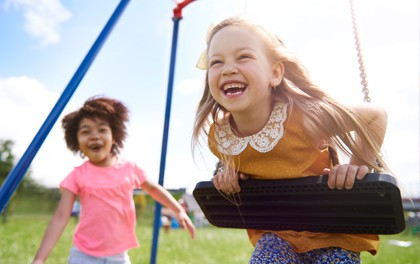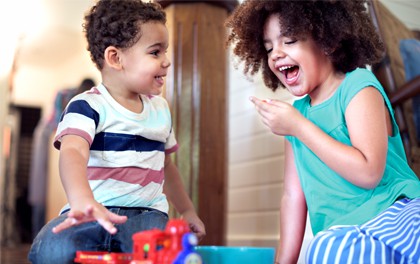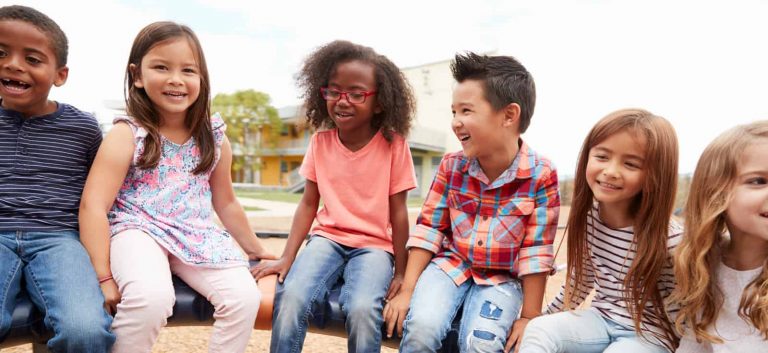Play is more than just fun and games: It’s vital to a child’s learning and growth.
Just as much as structured learning, play contributes to cognitive, social, physical, and emotional well-being and growth of children. It’s so important, play has even been recognized by the United Nations High Commission for Human Rights as a right of every child.[1]
But it’s not always easy for a child to have time for spontaneous, unguided play, especially with other children. Some children are limited by the geography of where they live. Many families have busy schedules packed with pre-planned activities. It can be hard for a child to get time for unstructured play with peers.
We’ll look at why play is so important, as well as how playdates can help you make sure your child gets to spend time in unstructured play.
Why Is Play Important for Children?
First of all, play is just plain fun. But more than that, play is an important part of a child’s mental and social development. Playing with other children helps build a child’s brain, and is also good for their physical development.[1]
While playing, children can improve their strength, muscle control, and coordination. They also learn to try new things and take risks, which can help them in other aspects of life.[2]
There are specific elements of play among children—social play—that are particularly helpful to your child’s social and emotional development. When children play together, undirected by a grown-up, they share ideas, listen to one another, and learn to negotiate and reach compromises. This makes social play (like what you’ll find in a playdate) an important part of growing up.
Play also has the following benefits for kids:
- Building self-confidence
- Boosting creativity
- Developing social skills
- Helping memory, language, and symbol recognition
- Teaching stress management
- Promoting healthy physical development
While self-play and play among children is important, it’s also important for you and other loving caregivers to play with your child. It tells them that you’re paying attention to them, and it allows children to express themselves through play. It’s a valuable opportunity to engage fully with your children.[1]
Setting Up and Preparing for a Playdate

You can consider starting with an outside location, like a favorite playground, that’s familiar to both children. This helps them get plenty of fresh air, and gives them lots of space for activities (and you won’t have to tidy up beforehand). Outdoor gatherings are also best at limiting the sharing of airborne germs.[4]
If the weather won’t cooperate, or if your child is nervous about new experiences, you can try hosting the playdate at your house. Your child may feel more comfortable there, and it’s easy for you to monitor the situation.
You’ll likely want to keep the playdate small and short, with only one or two other children, and planned for an hour or two.[3]
One of the most important benefits of a playdate is helping to develop social skills such as sharing. But there might be some times when that’s not an option, say with a special toy. If your child has a prized toy they might not be willing to share, you may want to put it out of sight before the playdate begins.[3]
Learning Lessons From Playing With Other Children
It’s hard to know what goes on inside a child’s head, so it might not always be obvious when children are playing well together or if things are starting to go off course. The Harvard Graduate School of Education has some pointers on how to make sure everyone’s having a good time.
Look for the three indicators of playful learning: choice, wonder, and delight.
- Choice: Children are setting their own goals, sharing ideas, negotiating, and choosing how long to play.
- Wonder: Children can create, explore, and pretend.
- Delight: Children are happy, being silly, and generally at ease.[2]
After the playdate, help your child reflect on how to behave in social situations by pointing out positive behaviors. For instance, you could praise them for letting the other child go first at a game or for when they shared a toy.
You may also take the chance to gently nudge them about social skills they can work on. For instance, if they weren’t great at sharing, you might ask them about it in a kind, non-judgmental way. (“It’s hard to share our favorite toys sometimes, isn’t it?”)[5]
Play is important, and it’s worth doing whatever you can to let your child explore free play time with others and by themselves.
Sources:
- Ginsburg, Kenneth R. “The Importance of Play in Promoting Healthy Child Development and Maintaining Strong Parent-Child Bonds.” Pediatrics. January 2007. https://pediatrics.aappublications.org/content/119/1/182
- Shafer, Leah. “Summertime, Playtime.” Harvard Graduate School of Education. June, 2018. https://www.gse.harvard.edu/news/uk/18/06/summertime-playtime
- EncouragePlay. “Tips for Setting Up Playdates.” September, 2015. https://www.encourageplay.com/blog/tips-for-setting-up-playdates
- Mills, Melissa. “The Post-COVID-19 Playdate Checklist Every Parent Needs.” Parents. July, 2020. https://www.parents.com/health/coronavirus/the-covid-19-pre-playdate-checklist-ever-parent-needs/
- Bright Horizons. “Getting The Most From Play Dates: Teaching Kids About Friendship.” https://www.brighthorizons.com/family-resources/playdates-and-teaching-kids-about-friendship

